‘We are surrounded by magic’
April 16, 2024 § Leave a comment
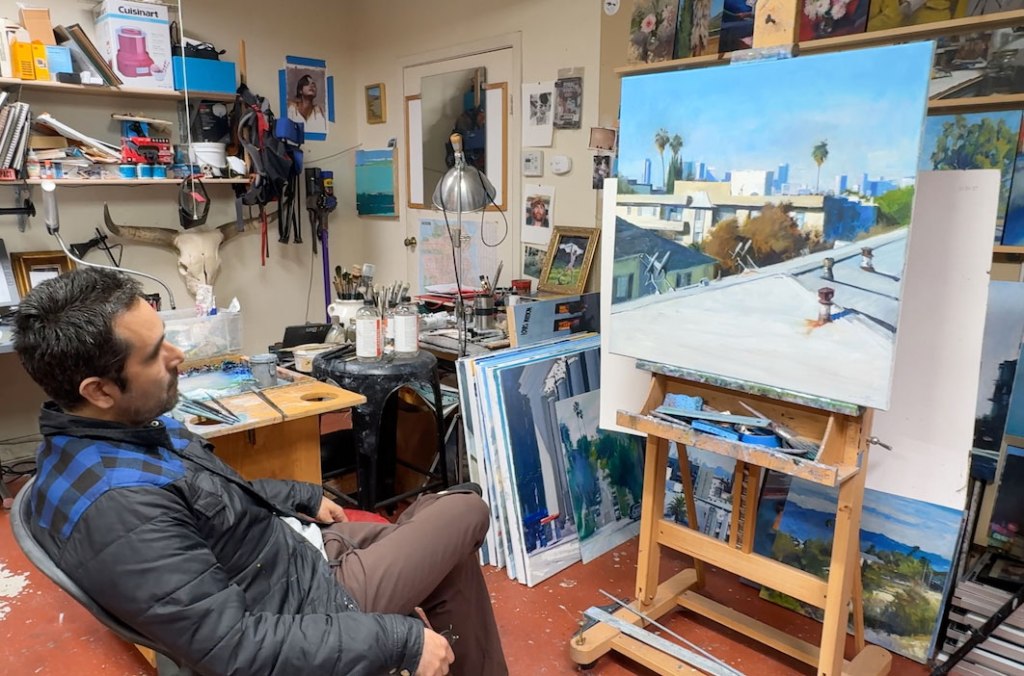
STUDIO VISIT | JOE CEBALLOS
When did you first begin to draw?
I have early memories of drawing and getting encouragement to make art in fifth grade. We would draw portraits of composers while listening to their music. It was in Mr. Bucy’s class at Madison Elementary School in San Gabriel.
Was it a big decision to pursue art in college?
It was certainly one that took a few years to arrive at. After high school, I worked in customer service jobs while I hopped around to several community colleges in the L.A. area, taking the maximum number of figure drawing classes allowed at each school. Typically that meant I would stay for two or three semesters before moving on. The portfolio I built in these classes led to my getting a job teaching drawing and painting at a private group of art schools in L.A. and Orange County. Outside of teaching, I continued to develop my own drawing and painting skills. By the time I made the decision to go back to school to get my degree, it was clear my career would be in art. I decided to apply to ArtCenter in Pasadena.
How did you end up going to ArtCenter?
I grew up in the San Gabriel Valley, east of L.A., and ArtCenter was a very well known and respected local school with an international reputation. A close friend of my brother studied there and highly recommended it. In addition to teaching after community college, I was taking figure drawing workshops and courses with instructors who were ArtCenter alumni, so I got a real sense of what my future could look like after graduating.
And you were recruited by Lucasfilm upon graduation?
In my senior year, George Lucas’s Industrial Light and Magic came to ArtCenter to review portfolios. I didn’t have a whole lot of technical work to show — meaning computer graphics — but I had tons of drawings and paintings that focused on realism. I honestly didn’t think I had a chance. I just wasn’t sure how my traditional skills would be useful in their digital world. A couple of months later, they reached out and made arrangements for me to fly up for an interview. I was told they were interested in my “painter’s eye” — and that I could learn the software involved. I moved to San Francisco and started the job about a month after that meeting.
And what was the job?
As a matte painter, my job was to digitally create realistic environments for film. A matte painting serves as an artistic backdrop, or set. Whether depicting a landscape, structure or interior, its purpose is to seamlessly blend with the footage. As technology advanced, digital painting and 3D modeling have revolutionized matte painting, enabling the creation of fantastical, or futuristic, or historically accurate locales. I worked on “Pirates of the Carribean,” “Mission Impossible” and two Harry Potter films at ILM, among others.
And you were slipping out of the office at lunch to sneak in a few minutes of painting.
Yes! It was a great way to break up all the time we spent making digital art in front of the computer. Our offices were in the Presidio in San Francisco, so I was surrounded by the wonders of the natural world. Painting was a good way to study and understand the real world — a key factor in creating believable places for feature films.
Has there been conflict between your day job and your artistic desires?
Not artistically, although finding time to paint was initially tough. The day job fed my personal art and vice versa. For me, the fundamentals — art and design, as well as storytelling — are much the same. The only difference is the tools being used.
The work I do in film and gaming relies heavily on technology. The images and moving pictures I create have to tell a very direct story, which demands special attention to how things are designed: how a composition is framed, where the viewer’s eye lands, the lighting and color — they all play major roles in communicating the mood and feeling of the story being told. Even the abstract shapes of things can influence our perception. These are all things I’ve learned through my years of working as a visual artist in the entertainment industry that have spilled over to my own personal fine art. My traditional painting has informed my ability to create a believable image on screen. Painting from life and outdoors has helped me learn how light, color and atmosphere all play out in nature. Studying the nuances of our world through the practice of painting has been a crucial part of my ability to bring computer-generated graphics to life.
At some point you left Lucasfilm, which seemed to be a dream job.
Yes, I left Lucasfilm and joined a startup company. The idea of starting something new and being a part of that from day one was an exciting and challenging opportunity. The type of work we set out to do was also going to be a chance to expand beyond the film work I was already doing. Projects like designing an opening video for a Kenny Chesney, illustrating a book cover for the “Ready Player One” concert tour and contributing to a Winter Olympics commercial are just a few examples of the types of projects we worked on. This was all in addition to continuing our work on blockbuster films such as “Thor,” “Iron Man,” “The Revenant” and “Elysium,” among many others. It was a nice creative buffet. After nearly 15 years at the startup and 40 film credits, I was ready to take on new challenges and broaden my skills, so I made the shift into interactive media two years ago.
And how do you describe your day job now?
The kind of work I’m doing now involves the latest technology in spatial computing and augmented reality. This enables an artist to bring what was once only visible on a screen into the real world. It’s a place where pixels and atoms can interact. This is all due to advancements in machine learning and computer vision. It’s a very interesting and pioneering space to be a part of.
Are you finding time to paint?
Yes, I’m painting more now than ever. My current work has afforded me a greater work-life balance, which gives me more time to paint. It’s almost a daily practice. This has allowed me to be more intentional with my subject matter and visual language. On the days I don’t paint, I’m most likely sketching and working on studies for new work. I’m also able to spend more time with my family. My wife is an artist as well — we met when we were both teaching art in Southern California. We have an almost 10-year-old boy who has a bottomless well of imagination and produces more art than anyone I’ve ever met! A perfect vacation for me is spending time at home with them in our Eichler in Marin County and making art all day.
How does your family background influence your art?
Growing up on the east side of Los Angeles, I was exposed to a lot of great Latino artists making work that really hits home and tells the story of our community. My parents migrated to the U.S. in their early 20s. Not really knowing the language, they were brave enough to come to this country for the opportunity to create a better life for themselves and their family. I am a first generation Mexican-American who had parents willing to work hard for their dreams. Because of them, I was born in California and have had the privilege of living in two beautiful and diverse cities. My father has always said that California welcomed him, and for that I will forever be grateful. I’m not sure that my work is saying anything that’s a direct commentary about the Latino experience. To me it’s more about living in the moment and trying to capture a small sliver of my time.
So you’ve lived in Los Angeles and San Francisco, and you paint both. Do you have a preference?
Tough one. L.A. will always be home, but the Bay Area has been a really nice place to settle into. Both cities offer their own stories and history, but also have many things in common. To me, the Bay Area sometimes feels like a condensed L.A. They both offer such a variety in terms of culture and art. They both are welcoming to people from around the world. San Francisco, with its innovations in tech, and Los Angeles, with its history in film and music, offer an artist so much inspiration.
I like to think that the two cities are closer to each other than some might think. To me, it’s all California. Having the privilege of living in these two places has been a major influence on my art.
What do Northern California and Southern California bring to your art that’s the same? And what’s different?
The atmosphere is certainly different, which influences the palette to a degree. I look for patterns that I find interesting. Both places have their own geography and architectural identity. I would describe S.F. as more vertical and stacking vs. L.A.’s more horizontal and sprawling environment.
The vistas I select to paint are snapshots of moments that encompass familiar qualities of L.A. or S.F. A certain time of day or weather pattern, a particular vanishing point, or an unusual angle that captures the essence of the location and triggers a memory or mood is what I’m after. I like to draw the viewer in with a first impression based on a strong composition of shapes and color. I hope that first read then compels them to connect with their own experiences of a place. One of the things I enjoy most is hearing the stories people tell me about how they personally relate to the paintings I create.
I look for beauty in our everyday existence — not just in those iconic S.F./L.A. panoramas, but also on a street corner or while stuck in freeway traffic. We are surrounded by magic in both cities.
VIEW THE SF/LA: JOE CEBALLOS EXHIBITION
Challenging SF’s ‘doom loop’ narrative
August 17, 2023 § Leave a comment
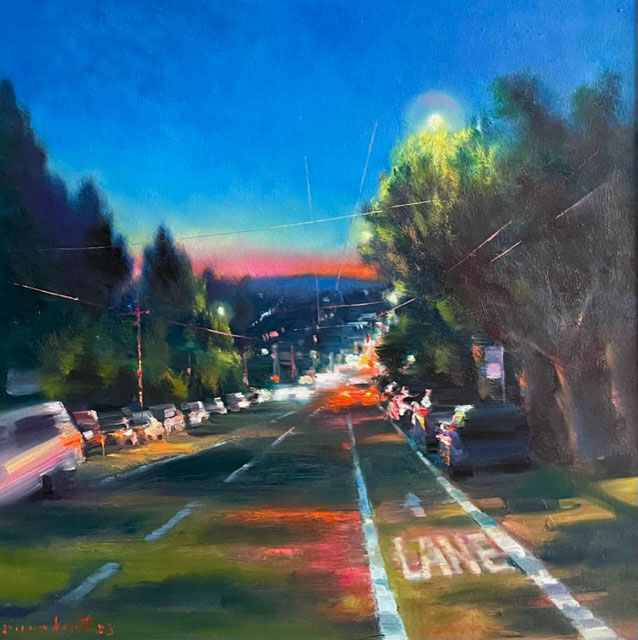
By MATT CHARNOCK
Underscore_SF
The adage that San Francisco is in a state of perpetual freefall has become clickbait as of late — but a new exhibition reminds us that SF is as resilient as it is beguiling.
San Francisco exists as a bastion for so many who left their homes to find a semblance of community; of kinship; to be in a community that celebrates themselves and what it means to live a good life on this entropic space rock. The Covid-19 pandemic forever changed our ideas of not only home but how we move about our daily lives.
The past three years have seen the media fixated on SF’s “mass exodus” and the decline of its downtown; the “doom loop,” if you will. But as we’ve waxed in countless tones and textures before: San Francisco’s problems aren’t unique — they exist in every large American metro to some degree.
But what is uniquely San Francisco is the city’s indefensible amounts of beauty. How it carries itself through seasons. The way SF elicits you to walk everywhere, bike everywhere else, and ditch your car keys for a Clipper card.
All of these peculiarities are on full display at the intersection of 17th and Harrison streets inside the 2121 Art Space.
For the month of August, the aforenoted culture hun has joined forces with the Thomas Reynolds Gallery to present San Francisco: Still Beautiful, an exhibition of cityscape paintings of San Francisco by artist Veerakeat Tongpaiboon. Included in the exhibition are two dozen recent paintings featuring scenes of San Francisco — each piece of art founded on Tongpaiboon’s three-plus decades in San Francisco.
Tongpaiboon’s style exists in a canon of creativity all to itself. He manages to create mesmeric dreamscapes that blur into the background, yet invite exceptional detail and investigations into the precision of each brush struck.
Tongpaiboon’s proclivity for urban living is apparent — “I like speed, I like buildings, I like cars,” he says. “The energy of the streets of San Francisco continues to inspire me.” His current display is a celebration of his life in San Francisco — a visual love letter to his years spent watching time pass in SF.
Slowly strolling through San Francisco: Still Beautiful is an exercise in stillness, gratitude and wonder. You’d be hard-pressed to not fawn and fall even deeper in love with SF by the time you exit.
Return to San Francisco
July 27, 2023 § 4 Comments
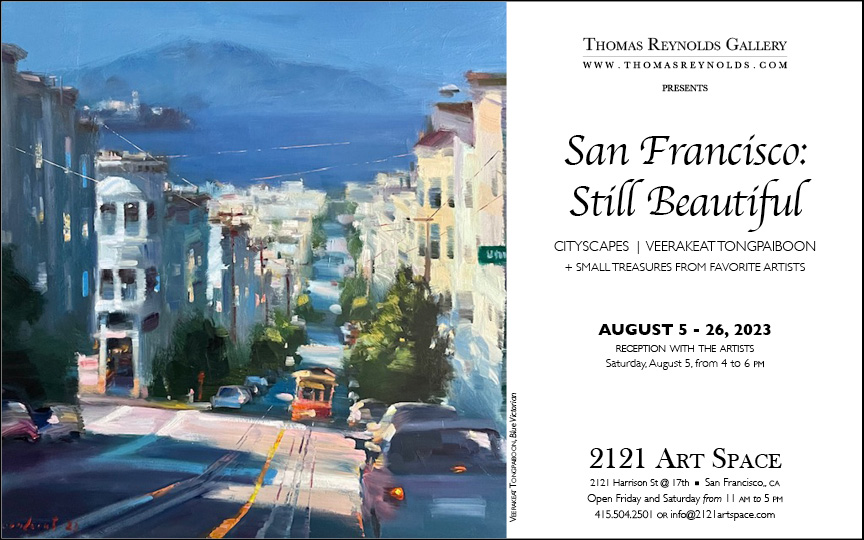
2121 ART SPACE joins forces with the Thomas Reynolds Gallery for the month of August to present “San Francisco: Still Beautiful,” an exhibition of cityscape paintings by San Francisco artist Veerakeat Tongpaiboon.
“Wielding a loaded brush, Tongpaiboon attacks his canvases boldly, favoring intense colors and skewed perspectives,” writes Southwest Artist magazine. Says the artist: “I like speed, I like buildings, I like cars. The energy of the streets of San Francisco continues to inspire me.” A native of Thailand, Tongpaiboon has been painting since he was 10 years old, winning major international competitions even as a teenager. In 1992 he came to San Francisco and earned his MFA degree at the Academy of Art. He has been a full time painter since, with work in collections throughout the U.S. and abroad.
This exhibition marks a return to San Francisco of the Thomas Reynolds Gallery, a fixture on Fillmore Street for 25 years before relocating to Santa Barbara in 2020.
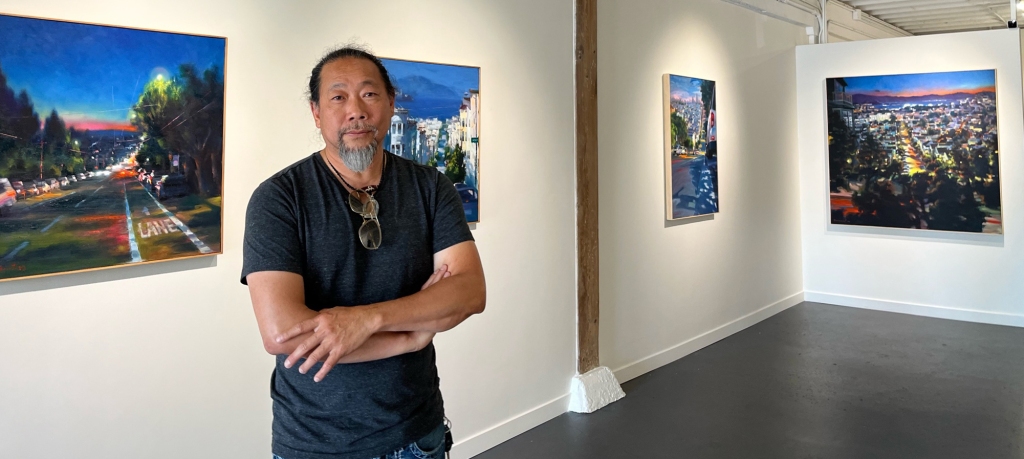
The Birth of Bay Area Figuration
June 23, 2023 § 1 Comment
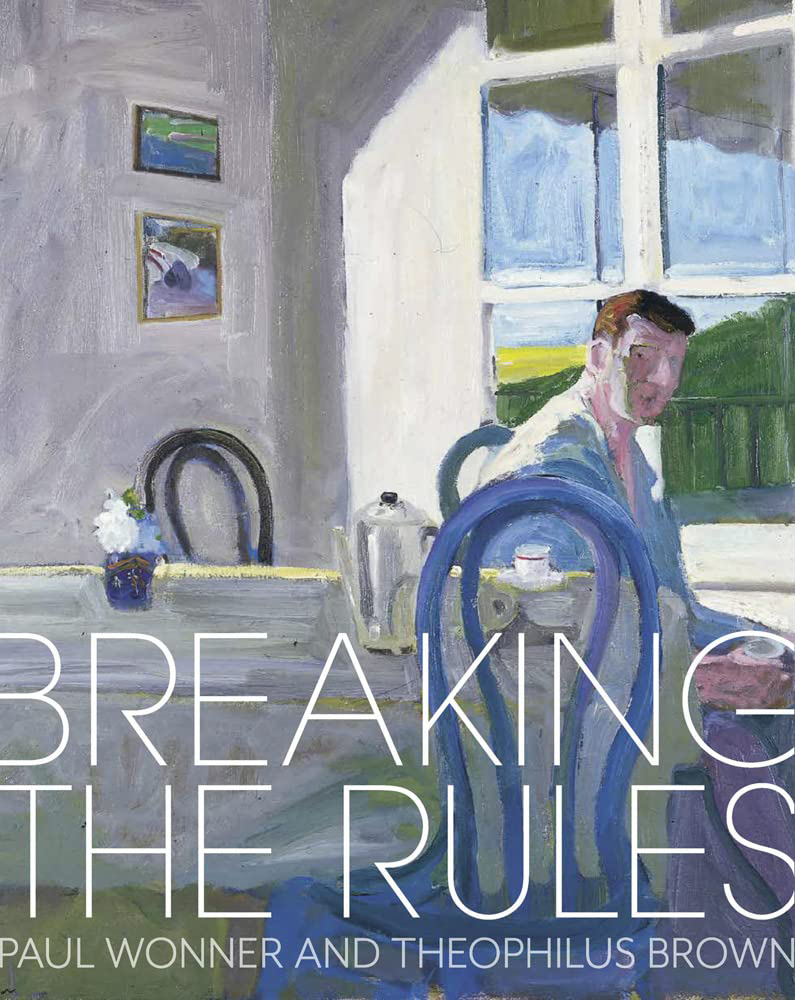
IN 1952, while studying for their master’s degrees in art, Paul Wonner and Theophilus Brown met at the University of California, Berkeley.
After graduating, they found studio space on Berkeley’s Shattuck Avenue, a building they shared with Richard Diebenkorn, David Park and Elmer Bischoff, among others, who met there for drawing sessions. From this creative association came the movement that became known as Bay Area Figuration (or the Bay Area Figurative Movement) in which recognizable subject matter and the gestural bravura of Abstract Expressionism co-existed.
It was the first contemporary artistic movement that achieved recognition in the United States and abroad that originated in California.
REVIEW: “Making the rules“

‘This may be my best painting’
June 6, 2023 § Leave a comment
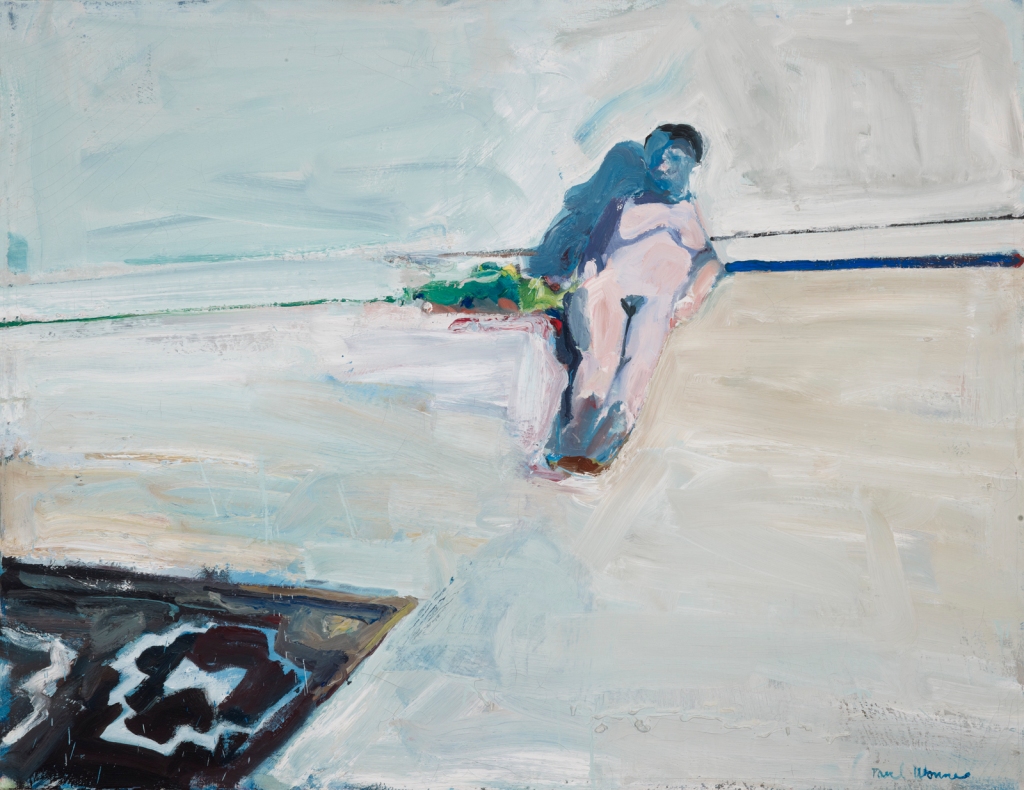
By MATT GONZALEZ
I first met Paul Wonner and Bill Brown in the early 2000s at the San Francisco home of the gallerist Charles Campbell and his artist wife, Glenna.
I particularly enjoyed watching Bill and Paul look at their own paintings, which hung in the Campbells’ Potrero Hill home. Charlie and Glenna had a wonderful collection, which included their Bay Area Figurative associates, including Richard Diebenkorn, David Park, Joan Brown, Manuel Neri, Elmer Bischoff, Wayne Thiebaud and Nathan Oliveira. There was something about the way that Bill and Paul studied their own paintings that seemed as if they were discovering them for the first time.
Once when I was with Paul and Charlie in the living room, among a Neri plaster and paintings by Frank Auerbach and Thiebaud, Paul was staring intently at one of his own paintings, his 1961 Nude with Indian Rug. I was anticipating his disapproval when he said, “This may be my best painting.” Charlie was so excited that he went over to the kitchen, asked Glenna and Bill to join us, and made Paul repeat the remark. Whether the wine had already gotten to him, I do not know, as Paul made too many fine paintings in my estimation to call any one of them his best. However, there was in his comment an excitement about engaging with a work from another era. We all enjoyed a hearty toast to the sentiment.
— excerpted from Breaking the Rules: Paul Wonner and Theophilius Brown, a catalog for the exhibition of the same title at the Crocker Art Museum in Sacramento, which continues through August 27.
‘Sargent & Spain’ in San Francisco
April 5, 2023 § 2 Comments
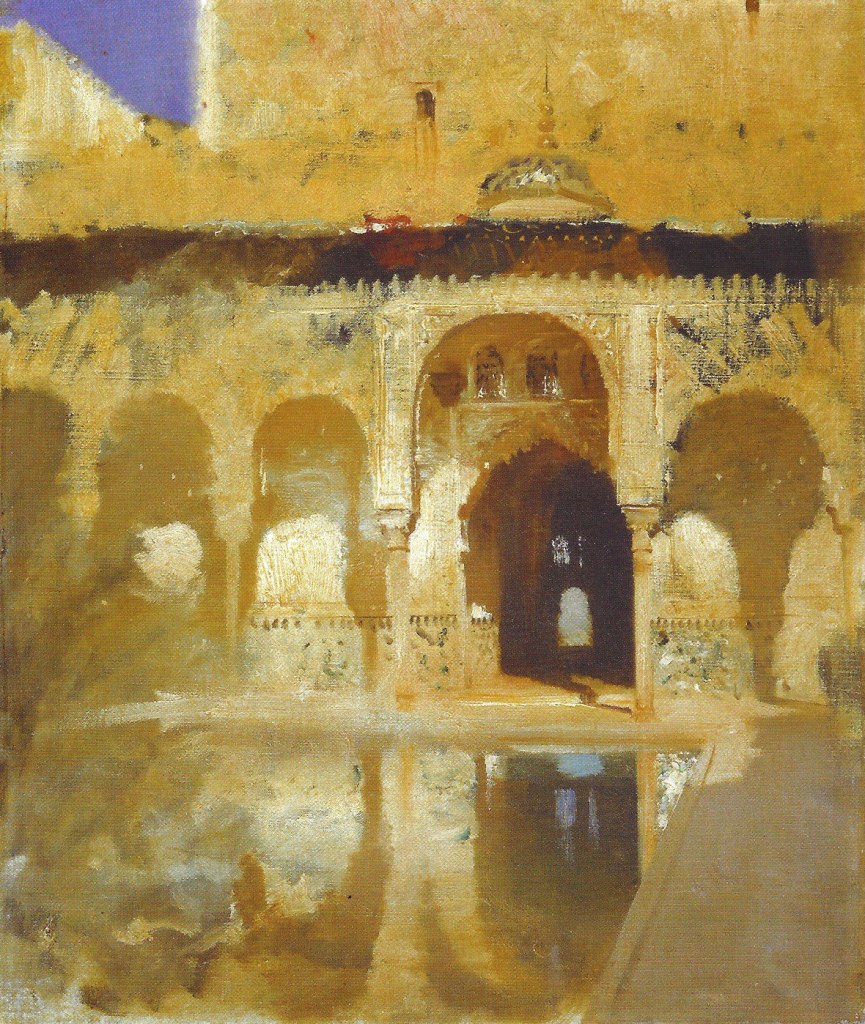
IF YOU’RE IN San Francisco in the coming weeks, you’ll surely want to make a visit to the stately Legion of Honor museum near Land’s End to see the “Sargent & Spain” exhibition. It presents the work of John Singer Sargent inspired by his travels in Spain and tells the story of his embrace of Spanish culture.
Sargent’s seven trips to Spain, taken between 1879 and 1912, fueled his imagination and influenced his artistic growth throughout his life. Born in Florence, Italy, to American parents who were travel enthusiasts, Sargent (1856–1925) journeyed extensively from his homes in London and Paris in search of subjects. His resulting body of work, including paintings inspired by Spanish art, architecture, gardens, people and traditions, encompassed far more than the society portraits for which he is best known.
This exhibition — which includes oils, watercolors, drawings and more — reveals Sargent’s affinity for Spain and his approach to depicting the rich subject matter he encountered there.
MORE: “Sargent’s Captivation with Spain Comes to Legion of Honor“
Thanks to John Singer Sargent
March 21, 2023 § Leave a comment

“IF IT WEREN’T for John Singer Sargent, I might not be painting watercolours today,” Michael Reardon tells The Art of Watercolour magazine in its new issue. “In 1985 there was a show of Sargent’s watercolours in San Francisco that knocked my socks off. I decided that I had to learn how to paint in watercolour. That’s how it all started.”
Read more: “Sensitivity and skill“
Getting on Jerry’s list
January 18, 2023 § 1 Comment

By MARIANNA STARK
I first met Jerry Ross Barrish in 2015 when he curated a solo show of Sam Perry’s sculpture at the nonprofit community gallery, Sanchez Art Center, in Pacifica, California. Sam Perry, who is my husband, and I were soon added to Jerry’s enormous “studio party” guest list. These “behind-the-scenes” affairs are magical in nature: Picture yourself at a packed artist studio party surrounded by Jerry’s sculptures of jazz musicians, angels, animals, clowns, dancers, Statues of Liberty, plus live music. On January 1, Jerry telephones every friend on his list with a New Year’s greeting and follows up throughout the year with invitations to opening receptions, fundraisers and artist talks at Sanchez, where he serves as artistic director.
In his sculptures, Jerry Barrish applies his deft hand to the cast offs of our materialistic consumer society to tell immutable tales of love and loss. Familiar items like umbrella handles, funnels and toys are transformed when combined with takeout containers, janitorial supplies and vacuum parts. Each element of these assemblage sculptures is placed in a way that perfectly expresses the universal language of gesture.
In my earliest imaginings of M. Stark Gallery, I knew I wanted Jerry’s art to inaugurate the gallery exhibition program.
To me, the piece Jerry calls Teaching, The Most Honorable Profession (2016) is in many ways a self-portrait. Since he became the artistic director of Sanchez Art Center in 2003 he has mentored dozens of artists. In the process of selecting works for exhibitions, he also discovers works in artist studios that merit further exploration and development and he continues the conversation with these artists in furtherance of both. After many, many helpful conversations about opening this new gallery — lighting, installation, public programs and even business hours — I am proud to call Jerry my mentor as well.
— excerpted from “Jerry Ross Barrish: Protagonist,” catalog for the inaugural exhibition at the new M. Stark Gallery at 727 Main Street in Half Moon Bay, California.

A tapestry of flowers
November 26, 2022 § Leave a comment

Gary Bukovnik with his “Flower Cascade” tapestry.
WHEN TWO TAPESTRIES of his flowers are released in the coming months, it will mark the realization of a long-held dream for Gary Bukovnik, the San Francisco artist whose floral watercolors are admired around the world.
“Many years ago when I when was first beginning to see tapestry as a possible fit for me and my art,” Bukovnik says, “I was contacted by the Atelier Raymond Picaud in Aubusson, France. After some talks we decided we should proceed. I made a cartoon for the 1 meter x 1.5 meter tapestry woven in the traditional way of Aubusson.”
It was a great success, and the six large tapestries of white pelargonium woven in the mid-80s sold immediately. So did a smaller tapestry of a waterlily. One of each is in the museum in Aubusson. But an economic downturn took the tapestry studio under before the partnership could flourish.
“Ever since those first works, I’ve wanted to return to this medium,” Bukovnik says. After viewing a 2020 exhibition of artist Hung Liu’s paintings hanging alongside tapestries of her work, he set about searching for a way to revive his interest in tapestry. He found it close to home. Magnolia Editions, which had made the Hung Liu tapestries, was just across the bay in Oakland.
“They were Jacquard woven tapestries that involved the newest technology,” Bukovnik says. “I had known Don Farnsworth, the director, a long time ago and asked for his guidance. There was a lot of back and forth across the bay, and finally we had chosen two images for weaving, which was done in Belgium, near the city of Bruges.”
Magnolia Editions describes itself as “a handshake between the art of the past and the art of the future” and notes: “Tapestries are an ancient medium, with antecedents from centuries past including Chinese kesi, Middle Eastern kilim carpets and Medieval European wall hangings. Yet these editions are created using cutting-edge software on state-of-the-art Macintosh computers and hot-rod industrial looms.”
The floral tapestries will be released by Magnolia Editions in an edition of 10, complete with hanging devices, for $18,000 each. Bukovnik is delighted. “I think they are quite amazing,” he says, “and I am really excited that I am on the path again to seeing my art interpreted in tapestry.”

Gary Bukovnik, “From the Garden of Earthly Delights,” 48 x 62 inches, Jacquard tapestry

Gary Bukovnik, “Flower Cascade,” 48 x 68 inches, Jacquard tapestry

A pair of Staprans studio visits
October 13, 2022 § 1 Comment

THE GREAT CALIFORNIA-LATVIAN painter and playwright Raimonds Staprans turns 96 today. It has been a treat to watch his friendship blossom with fellow artist Sandy Ostrau. Not long before his birthday, she paid a visit to his San Francisco studio. In turn, he and his wife, the scientist Ilona Staprans, repaid the visit with a stop at Sandy’s studio in one of the original buildings at the Sea Ranch, on the northern California coast.

“I love when he pokes my paintings!” Sandy says. “He liked that one, but the bottom needs resolving.”

“Ilona is just as amazing. PhD in Bio-Chem, ran a research lab at UCSF, and really supported Raimonds in his early career.”

“They appreciated my new easel, too,” Sandy says. “Both are remarkable. They are making a documentary in Latvia about him that is nearly done.”
Happy 96th, Raimonds!
— Thomas Reynolds
EARLIER: “Feasting with the Staprans“